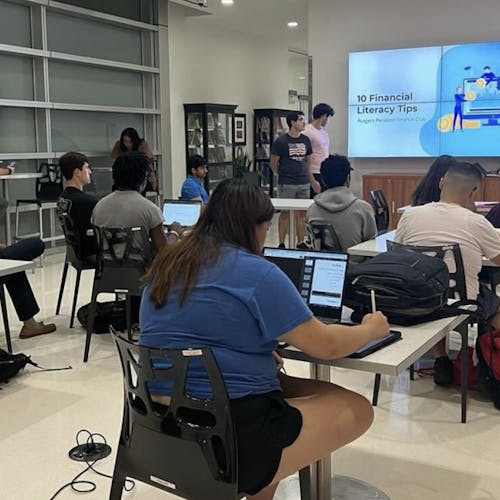Students raise public support to advocate for GMO labels

Brian Franklin, a School of Arts and Sciences senior, spent his spring break knocking on doors around the state to encourage citizens to support the labeling of foods that contain genetically modified ingredients.
Franklin, along with about 10 other Rutgers students who worked to raise public support for this issue, learned that 70 to 80 percent of food consumed in this country is genetically modified, Franklin said, including the majority corn and soybeans.
Peter Skopec, a program associate at New Jersey Public Interest Research Group, said the public should be concerned about Genetically Modified Organisms because most GMO crops are designed to lessen the need of pesticide and herbicide use but the chemicals can be very dangerous.
Skopec added that the Food and Drug Administration and other consumer health watchdog organizations are not testing GMOs to ensure their safety.
According to the Coalition for Safe and Affordable Food’s website, GMOs are safe and even beneficial, for human consumption.
“[Genetically modified] technology adds desirable traits from nature, without introducing anything unnatural or using chemicals, so that food is more plentiful,” according to the website.
Brian Kennedy works as the senior director of communications at the Grocery Manufacturers Association, which represents over 300 leading food, beverage and consumer product companies.
According to the association’s website, it Helps guide these companies to produce safe products through its commitment to using the latest scientific knowledge.
Through his experience, Kennedy learned that space on food labels is limited, and labeling GMOs could be seen as superfluous information.
“As required by FDA, the only mandatory information that appears there should focus on the safety and nutritional content of a product,” Kennedy said in an email. “A special mandatory label for GMOs does not meet that standard and would ultimately be misleading to consumers.”
Franklin heard about the issue while surfing reddit, but did not research it further until a representative from NJPIRG came to speak in one of his classes.
He is not sure why companies would not label GMOs.
“People have a right to know what’s in their food, so why shouldn’t they put a label on it like on the nutritional information? There should be something that says genetically modified foods,” he said.
Franklin said he was not sure what to expect going door to door, and he found a lot of families to be receptive because people want to know what’s in the food they eat.
“For the most part, the public does overwhelmingly agree for something as simple as putting an extra label on it … why not,” he said.
NJPIRG Citizen Lobby is working to promote a GMO labeling bill sponsored by Assemblywoman Linda Stender, D-22. The bill would require all genetically modified products sold in New Jersey to be labeled as such.
Such bills already exist in Connecticut, Maine and Massachusetts, Skopec said, and it has been on the ballot in other states.
GMOs have been on the market for more than 20 years. NJPIRG took up the issue about a year ago as GMO foods and genetically modified crops continue to have a growing influence of in agriculture.
He noted that more than 90 percent of consumers want GMO labels on their foods. He encourages consumers to get in touch with the stores they are shopping at and with local legislators to express their desire to see GMO labeling.
Companies like Whole Foods Markets, Inc., Chipotle Mexican Grill and Ben & Jerry’s have already started labeling GMO products in response to their customers, Skopec said.
Meanwhile, NJPIRG Student Chapters pushes to get Rutgers students involved because they are consumers like everyone else and they are interested in this issue.
Both the student chapter and Citizen Lobby are building grassroots support through canvassing, which is a big part of NJPIRG’s work. They also went to Stop & Shop last Friday to encourage them to label products made with GMOs.
Franklin said they handed the manager petitions signed by residents of New Jersey, and the manager said he would pass them on to those above him. The manager was not sure how much change would take effect.
After realizing the simplicity with which the issue of GMO labeling could be remedied, Franklin knew this was a campaign worth working on.
“So although I wasn’t really passionate about it beforehand, I did know about it, and NJPIRG gave me more information to kind of fire up some passion inside me,” he said.
A previous version of this article did not specify the specific responsibilities of NJPIRG Citizen Lobby and NJPIRG Student Chapters.



